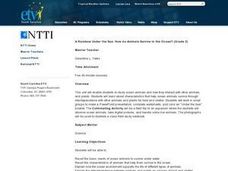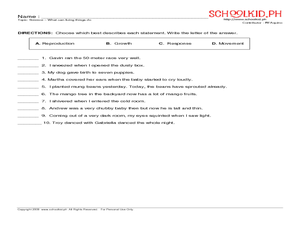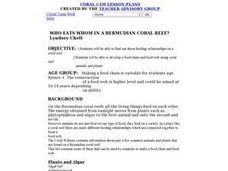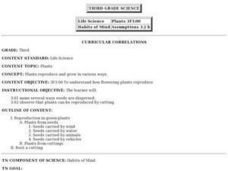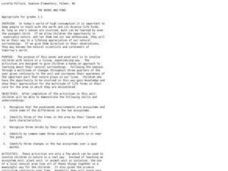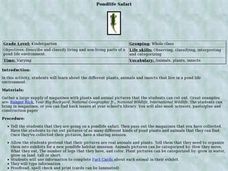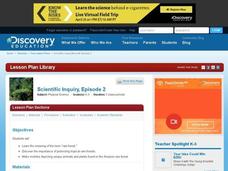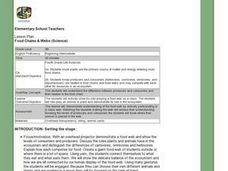Curated OER
A Rainbow Under the Sea: How do Animals Survive in the Ocean?
Second graders read books, watch videos, complete worksheets and participate in class discussions about ocean animals. They, in groups, design PowerPoint presentations on selected marine animals.
Curated OER
Botany
In this botany worksheet, students read a 2 page article on botany, choose the multiple choice answer to 3 questions, determine if 3 statements are true of false and fill in the blanks in 5 facts about botany.
Curated OER
Science - What Can Living Things Do
In these living things worksheets, learners write true or false for the sentences about living things. Students answer the questions about living things and choose the words that best describe the statements about living things.
Curated OER
Animals of the African Savannahs
Students create and describe a new animal that live on the savannah following the characteristics of savannah wildlife discussed in the instructional activity.
Curated OER
Cultural Murals
Seventh graders research the cultural time period of early Wisconsin people. They create a mural depicting the diet, shelter, activities, climate, clothing, tools, and other materials used.
Curated OER
Habitat
Fourth graders study the components of a habitat. In this animal habitat lesson, 4th graders define the elements of a habitat. Students discuss intertidal habitats and make a habitat for a crab.
Curated OER
Exploring Texture In the Garden
Students explore the garden environment. In this garden environment lesson, students investigate the needs and parts of a plant. Students discover the differences between fruits and vegetables while creating their own garden.
Curated OER
Comparing Plant and Animal Cells
In this cell comparison worksheet, students complete a table in which they compare the cell parts and organelles of plants and animals. They answer 4 short answer questions based on the information in the table.
Curated OER
Partners in Nature
Students role-play how animals and plants depend on and help each other in symbiotic relationships. Working in pairs, they role-play the animals' relationship. They may also choose to draw pictures of these partnerships.
Curated OER
Who Eats Whom in a Bermudian Coral Reef?
Young scholars will be able to find out about feeding relationships on a coral reef. They then will be able to develop a food chain and food web using coral reef animals and plants using the Coral Website.
Curated OER
Learning about a Culture from a Story
Students identify environmental influences on a traditional culture, animals and plants important to a traditional culture, and interpret the identity of a traditional culture from objects and a creation story.
Curated OER
Plants Reproduce and Grow in Various Ways
Third graders take a walk around the outside of the school and examine their clothing to see if they picked up any seeds while on their walk. They discuss how seeds travel and how a new plant thus can form. They then observe root...
Curated OER
the Wonder of Wetlands
Students explore the importance of the wetland ecosystem, its properties and functions, as well as, the many birds, animals, and plant life found there.
Curated OER
The Woods and Pond
Students explore nature in a living, experiencing way. In this woods and ponds lesson plan, students recognize that ponds/woods environments are ecosystems, identify three of the trees in the area by their leaves and bark...
Curated OER
A Walk in the Forest
Students explore interrelationships among plants and animals. Students listen to Where to, Little Wombat? by Charles Fuge, and contribute words and phrases for a classroom animal and plant survival chart. Students take a walk in a...
Curated OER
Animal and Plant Habitats
Second graders write and illustrate a story. In this habitats lesson plan, 2nd graders learn about different types of plant and animal habitats. Students view video segments about habitats, answer comprehension questions, complete a...
Curated OER
Camp Expedition
Students select an animal to research that lives in the camp environment. Students spend time using books and the Internet to research their animals, including size and appearance. Students create a mural to depict the environment and...
Curated OER
Pond-life Safari
Students determine the living and non-living parts of pond life. In this pond life lesson, students examine the plants, animals, and insects that live in ponds. They look through a variety of print media, cut out pictures, and arrange...
Curated OER
The Unique Rain Forest
Students explore the unique Rain Forest. In this Rain Forest lesson, students watch a video about the dangers the Rain Forest faces. Students create a Rain Forest mobile. Students choose plants or animals from the Rain Forest then write...
Curated OER
Camouflage
First graders learn how plants and animals adapt to their environments. In this camouflage lesson, 1st graders watch a movie that explains animal camouflage, design a butterfly that blends into a classroom habitat, create a mini book...
Curated OER
Wild, Wild Wetland Wildlife
Students investigate biology by participating in a science experiment. In this dissection lesson, students conduct a nature field trip around their school grounds and identify animals, plants, tracks and waste. Students dissect an owl...
Curated OER
Soil Composition
Students examine soil. In this soil composition lesson students participate in soil sedimentation and filtration activities. The students discuss what non-living and living things are in soil and why it is so important.
Curated OER
Food Chains & Webs
Fourth graders examine roles of animals in food chain, explore roles of humans, plants, and animals in ecosystem, create their own food webs, and role play producers, consumers, and decomposers.
Curated OER
Plant and Animal Changes
Second graders listen as the book, "What Do Animals Do In Winter?" is read to the class. They discuss that during the winter, some animals migrate, hibernate, hide, change color, and some make changes in their bodies like growing extra...
Other popular searches
- Plants and Animals
- Arctic Plants and Animals
- Aquatic Plants and Animals
- Coastal Plants and Animals
- Artic Plants and Animals
- Plants and Animals Needs
- Plants and Animals Interact
- Desert Plants and Animals
- Plants and Animals Die
- Attic Plants and Animals
- Comparing Plants and Animals
- Animals Plants and Water


